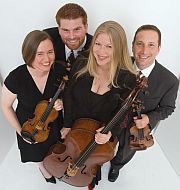Demon Barber of That Adagio
San Francisco Classical Voice
December 13, 2009
By Michelle Dulak Thomson
Most schools of music host concert series, not only by their own students and faculty but also by local (or even visiting) artists: What better way to keep the students inside in touch with the professional music community outside? But the Crowden Music Center's "Sundays@4" series, as befits the CMS' community-centered mission, has little of the conservatory feel about it.

The performance space is smallish and informal, the atmosphere relaxed, and the tickets cheap (tickets are free for children under 18). The recitals I've attended, by Crowden alumni, faculty, and other Bay Area–based musicians, have been formidable in musical level but nothing else. The vibe is positively neighborly.
"Sundays@4" seems a made-to-order environment for the Cypress String Quartet. The players are veterans of any number of collaborative, multimedia, and educational projects. The best-known of these is the "Call and Response" commissioning project, in which Cypress asks a composer to write a work complementing one or more familiar classics of the quartet repertoire. They've done this yearly for more than a decade (the 11th commission, Elena Ruehr's String Quartet No. 5, gets its debut performance next February), and the level has been impressively high.
Jennifer Higdon's Impressions was the "Call and Response" piece for 2003 (SFCV's review of the premiere is here), and it's a honey, an airy, transparent essay largely in pastels, but not without backbone beneath the lovely surfaces. It has been great to see it persisting in the Cypress Quartet's programming over the years.
It's no surprise, though, that the quartet has come to regard its initial programming idea — the Higdon was designed to share a concert with the Debussy and Ravel Quartets — as maybe a little too much of a good thing. The Debussy is also on the "Sundays@4" program, but the third piece is that instantly-familiar-but-hardly-ever-played oddity, Samuel Barber's 1936 String Quartet, Op. 11. I say "instantly familiar" because the Molto adagio second movement of the Barber Quartet is better known (much, much better) as the Adagio for Strings. Once the movement was let out on its own and became an instant success, few have had much use for its original setting.
It's certainly a strange setup: a bold, muscular first movement that nonetheless draws most from the gentler side of Barber's harmonic palette; then the famous Adagio; then a tiny, truncated reprise of the first movement, just long enough to work up to a forthright ending. It's difficult not to feel a bit of a jolt as the Adagio starts; before you can stop yourself, you're thinking "What's that doing in here?" But it's fascinating to try thinking of the thing, with all its accumulated cultural associations (Platoon, various famous funerals, and so on) as it once was: merely the meat in Barber's quirky structural sandwich. The Cypress, lovers of revealing juxtapositions and surprising contexts, must get of a kick out of playing this, the rare piece you can radically "recontextualize" simply by playing it as written.
Michelle Dulak Thomson is a violinist and violist who has written about music for Strings, Stagebill, Early Music America, and The New York Times.
Event Information
Chamber Music

Sundays @ Four: Cypress String Quartet
- Organization: Cypress String Quartet
- Venue: Crowden Music Center
- City: Berkeley
- Date: December 13, 2009 4:00 PM
- Price Range: $15 general admission at the door; free for children 18 and under
- Tickets: 510-559-6910